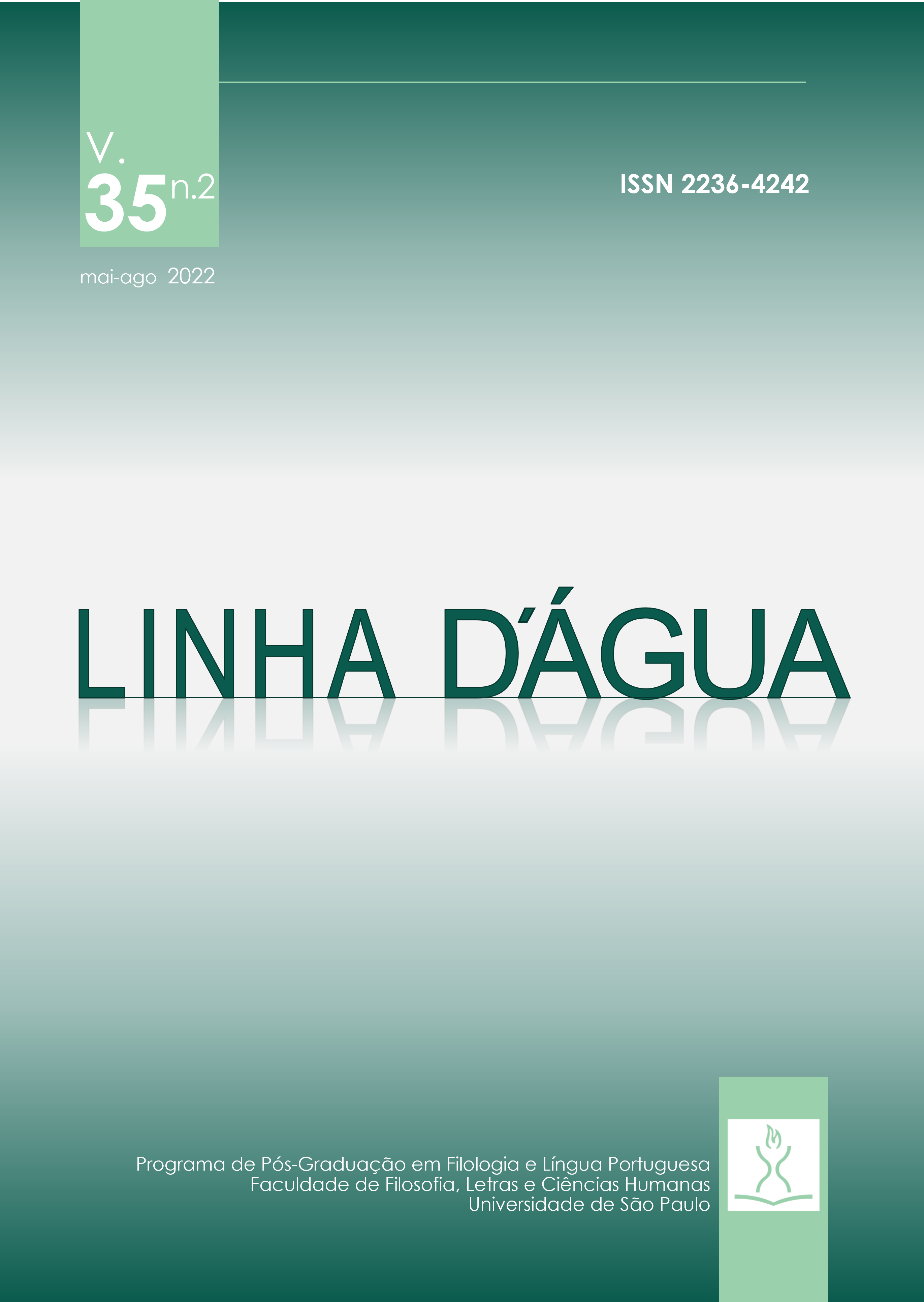Comparação entre livros didáticos de inglês e francês para negócios: uma análise discursivo-cultural
DOI:
https://doi.org/10.11606/issn.2236-4242.v35i2p16-32Palavras-chave:
Análise comparativa do discurso , Gênero discursivo , Cultura discursiva , Metafunção ideacional , Manuais de linguagem empresarialResumo
O foco deste artigo é apresentar a disciplina Análise Discursivo-Cultural e mostrar como esta abordagem foi utilizada na análise dos manuais de cursos de idiomas para negócios publicados na França e no Reino Unido. Após apresentar os fundamentos da disciplina, duas áreas de comparação serão exploradas. A primeira área diz respeito à representação da atividade profissional e examina como o trabalho das mulheres e dos homens é representado de forma diferente nos manuais de ambas as línguas. A segunda área explora como a idade das personagens contribui para a representação de um tipo específico de mulher nos manuais franceses, enquanto nos manuais ingleses a idade serve para representar uma oposição entre a juventude e a velhice. Esses resultados evidenciam como uma abordagem contrastiva revela certos aspectos dos manuais de ambas as línguas que passariam despercebidos numa análise de um único conjunto de manuais.
Downloads
Referências
ADAM, J-M. Linguistique textuelle: des genres de discours aux textes. Paris: Éditions Nathan, 2011 [1999].
ANDERSON, E. Représenter les femmes au travail: une analyse du discours contrastive de manuels d’anglais et de français des affaires. Doctoral thesis in Language Sciences. Université Paris Descartes/Université Paris Cité, 2019.
BANKS, D. Introduction à la linguistique systémique fonctionnelle de l’anglais. Paris: L’Harmattan, 2005.
BANKS, D. A Systemic Functional Grammar of French. Abingdon: Routledge, 2017.
BEACCO, J-C. Les genres textuels dans l’analyse du discours: écriture légitime et communautés translangagières. Langages, n. 105, p. 8-27, 1992.
BEACCO, J-C. Trois perspectives linguistiques sur la notion de genre discursif. Langages, n. 153, p. 109-119, 2004.
BRUGEILLES, C.; CROMER, S. Analyser les représentations du masculin et du féminin dans les manuels scolaires. Paris: Les Collections du CEPED, 2005.
GENETTE, G.; MACLEAN, M. Introduction to the Paratext. New Literary History, v. 22, n. 2, p. 261-272, 1991.
HALLIDAY, M.A.K. Explorations in the Functions of Language. New York: Elsevier North-Holland Inc., 1973.
HALLIDAY, M.A.K.; MATTHIESSEN, C. An Introduction to Functional Grammar. 3rd ed. London: Holder Arnold, 2004.
HARTMAN, A. Aging as a Feminist Issue. Social Work, v. 35, n. 5, p. 387-388, 1990.
HYLAND, K.; TSE, P. ‘She has received many honours’: Identity construction in article bio statements. Journal of English for Academic Purposes, v. 11, n. 2, p.155-165, 2012.
IRIGARAY, L. Je, Tu, Nous. Oxon: Routledge, 2007 [1990].
KRAMSCH, C. Language and Culture. Oxford: Oxford University Press, 1998.
VAN LEEUWEN, T. Discourse and Practice: New Tools for Critical Discourse Analysis. New York: Oxford University Press, 2008.
MAINGUENEAU, D. Discours et analyse du discours. Paris: Armand Colin, 2014.
MAINGUENEAU, D. Analyser les textes de communication. Paris, Armand Colin, 2016.
MOIRAND, S.; TRÉGUER-FELTEN, G. Des mots de la langue aux discours spécialisés, des acteurs sociaux à la part culturelle du langage: raisons et conséquences de ces déplacements. ASp, n. 51-52, p. 7-33, 2007.
VON MÜNCHOW, P. Les journaux télévisés en France et Allemagne: Plaisir de voir ou devoir s’informer. Paris, Presses Sorbonne Nouvelle, 2004.
VON MÜNCHOW, P. Langue, discours, culture: quelle articulation ? Signes, discours et sociétés, n. 4, 2010.
VON MÜNCHOW, P. Lorsque l’enfant paraît... Le discours des guides parentaux en France et en Allemagne. Toulouse: Presses Universitaires du Mirail, 2011.
VON MÜNCHOW, P. La notion de culture discursive en analyse du discours contrastive. In: DIANTEILL, E. (éd.). La culture et les sciences de l’homme: un dialogue avec Marshall Sahlins. Paris: Archives Karéline, 2012. p. 113-129.
VON MÜNCHOW, P. Quand le non-dit n’est pas l’implicite: comment rendre visibles les silences dans le discours ?. Signes, discours et sociétés, n. 17, 2016.
VON MÜNCHOW, P. Penser le non-dit en Critical Discourse Analysis, Analyse du Discours Française et Analyse du Discours Contrastive. In: ABLALI, D.; ACHARD-BAYLE, G.; REBOUL-TOURÉ, S.; TEMMAR, M. (éds.). Texte et discours en confrontation dans l’espace européen. Berne: Peter Lang, 2018. p. 431-445.
VON MÜNCHOW, P. National Socialism and World War II in German and French history textbooks. Learning through words and through silence. In: LENK, H.E.H.; HÄRMÄ, J.; SANROMÁN, B.; SUOMELA-HÄRMA, E. (eds.). Studies in Comparative Pragmatics. Cambridge: Cambridge Scholars Publishing, 2019. p. 19-44.
VON MÜNCHOW, P. L’analyse du discours contrastive. Théorie, méthodologie, pratique. Paris: Éditions Lambert Lucas, 2021.
NIENKÖTTER SARDÁ, D. Les manuels de philosophie en France et au Brésil: Une analyse du discours contrastive de la prise en charge énonciative. Doctoral thesis in Language Sciences. Université Paris Descartes, 2015.
PALTRIDGE, B. Genre and English for Specific Purposes. In: PALTRIDGE, B.; STARFIELD, S. The Handbook of English for Specific Purposes. West Sussex: Wiley-Blackwell, 2013. p. 347-365.
COTTON, D.; FALVEY, D.; KENT, S. Market Leader. Essex: Pearson Education Limited, 2010.
GRANT, D.; MCLARTY, R. Business Basics. Oxford: Oxford University Press, 2006.
HUGHES, J.; NAUNTON, J. Business Result. Oxford: Oxford University Press. 2014.
KOESTER, A.; PITT, A.; HANDFORD, M.; LISBOA, M. Business Advantage. Cambridge: Cambridge University Press, 2012.
TRAPPE, T.; TULLIS, G. Intelligent Business Coursebook. Harlow: Pearson Education Limited, 2005.
WHITBY, N. Business Benchmark. Cambridge: Cambridge University Press, 2013.
BLOOMFIELD, A.; TAUZIN, B. Affaires à suivre. Paris: Hachette, 2001.
CHERIFI, S.; GIRARDEAU, B.; MISTICHELLI, M. Travailler en français en entreprise. Paris: Les Éditions Didier, 2009.
DUBOIS, A-L.; TAUZIN, B. Objectif Express 2: le monde professionnel en français. Vanves: Hachette Livre, 2016.
MITCHELL, M.; FLEURANCEAU, A. Pour parler affaires: Méthode de français professionnel. Paris: Éditions Maison des Langues, 2011.
PENFORNIS, J-L. Français.com. Paris: CLE International, 2011.
ROSILLO, M.; MACCOTTA, P.; DEMARET, M. Quartier des affaires. Paris: CLE International, 2013.
Downloads
Publicado
Edição
Seção
Licença
Copyright (c) 2022 Elaine Anderson Joseph

Este trabalho está licenciado sob uma licença Creative Commons Attribution-NonCommercial 4.0 International License.
A aprovação dos manuscritos implica cessão imediata e sem ônus dos direitos de publicação para a Linha D'Água. Os direitos autorais dos artigos publicados pertencem à instituição a qual a revista encontra-se vinculada. Em relação à disponibilidade dos conteúdos, a Linha D'Água adota a Licença Creative Commons, CC BY-NC Atribuição não comercial. Com essa licença é permitido acessar, baixar (download), copiar, imprimir, compartilhar, reutilizar e distribuir os artigos, desde que para uso não comercial e com a citação da fonte, conferindo os devidos créditos autorais à revista.
Nesses casos, em conformidade com a política de acesso livre e universal aos conteúdos, nenhuma permissão é necessária por parte dos autores ou do Editor. Em quaisquer outras situações a reprodução total ou parcial dos artigos da Linha D'Água em outras publicações, por quaisquer meios, para quaisquer outros fins que sejam natureza comercial, está condicionada à autorização por escrito do Editor.
Reproduções parciais de artigos (resumo, abstract, resumen, partes do texto que excedam 500 palavras, tabelas, figuras e outras ilustrações) requerem permissão por escrito dos detentores dos direitos autorais.
Reprodução parcial de outras publicações
Citações com mais de 500 palavras, reprodução de uma ou mais figuras, tabelas ou outras ilustrações devem ter permissão escrita do detentor dos direitos autorais do trabalho original para a reprodução especificada na revista Linha D'Água. A permissão deve ser endereçada ao autor do manuscrito submetido. Os direitos obtidos secundariamente não serão repassados em nenhuma circunstância.











